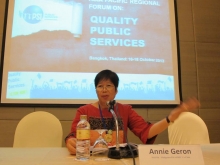Funding Quality Public Services – Tax Justice Campaign

PSI Communications Coordinator Teresa Marshall reviewed the work PSI and our affiliates have been doing for the past several years to advance the international Robin Hood Tax (financial transactions tax) campaign, the tax justice mandate passed by PSI members at our recent World Congress, and the commitment made this year by the Council of Global Unions to endorse tax justice as a priority focus of the CGU Quality Public Services-Action Now! Campaign. PSI is working with global unions and allies to advance the tax justice movement around the world now.
Lidy Nacpil, Coordinator of Jubilee South – Asia Pacific Movement on Debt and Development, noted that one of the most important responsibilities of a state is to provide quality public services for the benefit of all. Ensuring a just, fair and efficient tax system is central to ensuring quality public services. Taxes should promote equity and the redistribution of wealth. She spoke about the difference between progressive and regressive taxation. Further, direct taxes on income, wealth and property are generally (but not always) more equitable to indirect taxes – such as consumer or VAT/GST taxes which force lower income earners to pay more proportionally. Taxation should not be an additional burden to those who earn barely enough to meet their basic needs. She suggests that one tool is to use a Citizens’ Review of National Tax Systems.
Nacpil also defined the difference between tax avoidance and tax evasion. Avoidance involves exploiting tax laws and policies to minimize or avoid paying taxes. Evasion occurs when tax laws and policies are violated to escape paying taxes.
Tax incentives or tax holidays for transnational companies and investors also promote a ‘race to the bottom’ among countries. Tax havens are also a major issue today.
She also spoke about the formation of the new Global Alliance for Tax Justice, focused on campaigning, with which PSI supports engagement in at the regional level. During the WTO meetings in December in Bali, interested tax justice organizations will be holding a preparatory meeting to form an Asia GATJ network. PSI and affiliate unions are invited to join in building the Asian tax justice movement.
Katsuhiko Sato, Asia Pacific Coordinator for an International Solidarity Levy, spoke about Japanese trade union involvement in the development of the international solidarity levy as a financial transactions tax. The ISL was proposed in 2005 as a financing concept to achieve UN Millennium Development Goals. Eleven European Union countries are now poised to introduce a financial transactions tax in 2014. Japan is also discussing the ISL option. Katsuhiko asked unions to see the final report (link below) of the Commission for the Promotion of International Solidarity Levies, for more on this initiative.
PSI Senior Policy and Advocacy Officer Daniel Bertossa spoke about the issue of taxation and transfer pricing and PSI’s related work with the OECD. He emphasized that there is something unions can do to combat tax injustice – recognizing that tax is political and solutions can be found through advocating for better government choices.
UNI-APRO representative Jayasri Priyalal brought a message of solidarity on the need for economic justice from sister global union UNI, saying “Don’t privatize public services – but socialize profits.”
PSI APREC Co-Chair Annie Geron spoke about possible economic justice solutions, such as the alternative budget initiative in the Philippines. She connected the need for tax justice and progressive taxation sources to fund post-2015 Millennium Development Goals.
Download the tax justice presentations (PDF):
- PSI tax justice campaign by Teresa Marshall, PSI
- Multinational tax avoidance, by Daniel Bertossa, PSI
- MDGs in Asia/Pacific, by Jayasri Priyalal, UNI-APRO
- Tax justice and quality public services by Lidy Nacpil, Jubilee South
- International Solidarity Levy by Katsuhiko Sato, PSI-APRO

